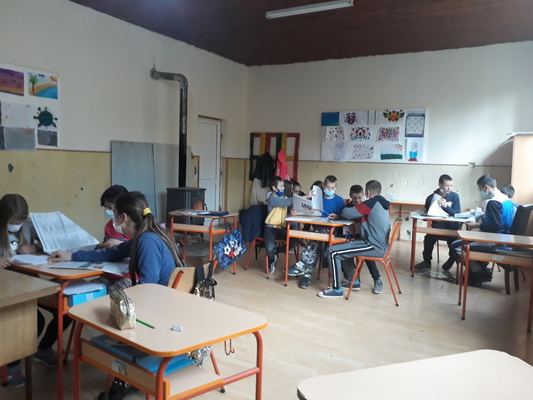FIGHTING FAKE NEWS - tasks.docx
FIGHTING FAKE NEWS - workshop.docx
FIGHTING FAKE NEWS - presentation.docx
OŠ Sveti Petar Orehovec - Croatia
Fake news is becoming a profitable business.docx
Lažne vijesti postaju unosan biznis.docx
Fake news is becoming a profitable business
American company Disinfomedia runs several web pages for creating fake news
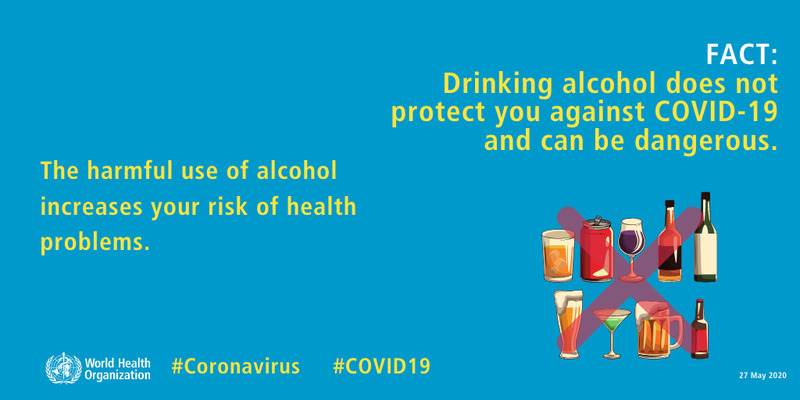
On the fake news workshop (19 October), we the students from 6 A have learned that the authors of fake news want to earn money off of them and influence someone's opinion. To prepare this article my task was to search the Internet and find a few fake news authors. That is how I have discovered American Jestin Coler. He is not only writing fake news, but he has started the company Disinfomedia. inc that owns a couple of pages for placement of fake news. After the portal Deutsche Welle (DW) in 2016 Coler employed between 25 and 30 authors who were in charge of fake news articles.
Some of the fake news from his company influenced the attitudes of the American people during the presidential elections in 2016 when Donald Trump became the president. In the same DW article, we found the information that two fake news authors from Long Beach claim to earn between 10 and 40 thousand euros a month from commercials on their sites.
I found some more interesting information on the Internet. During the pandemic caused by the Covid-19 virus, a new term 'infodemia' was created because of the increasing number of fake news connected to the coronavirus. Many people use this situation to earn on fake news. Naive people who believed in some of that fake news bought various miraculous products against coronavirus. Some of them even had serious health consequences.
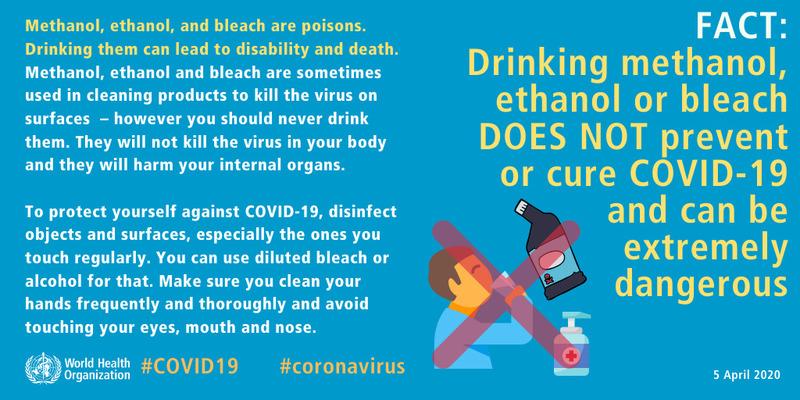
Portal RTL mentions research by the American Journal of Tropical Medicine and Hygiene magazine. In that research, it was determined that around 5800 people ended up in the hospital as a consequence of believing in fake news. They were naive enough to drink methanol or cleaning supplies that contain alcohol thinking that they will be protected from the virus. The same article states that scientists published that in the first 3 months of this year around 800 people dyed after using those 'medications'.
I was pretty amazed that adults can be so naive. If they had learned like we did that things we read and hear have to be verified with other sources, that the authors and pages that publish the news need to be checked, maybe they wouldn't do that. That is why I think that all of us need to learn about media and media messages to improve our media literacy. This is important so that we would not be in a group of naive people on whom someone will make money or, more tragically, who will die due to uncritical reading of 'news'. /Amadea Bošnjak 6. a; photos downloaded from the Internet/
The original article is available in the school online digital newspaper KLINČEK.
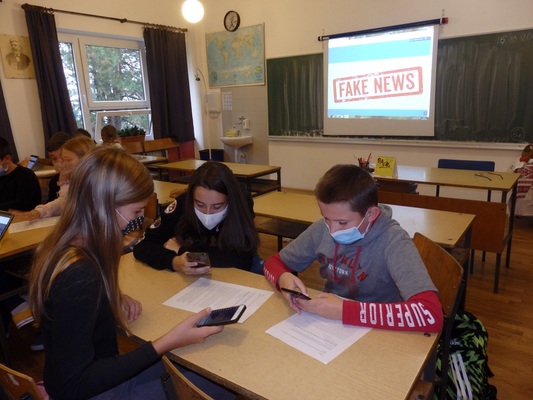
Workshop about fake news in School St. Petar Orehovec - 19. October 2020
OŠ "ĐURO ESTER" KOPRIVNICA, CROATIA
FAKE NEWS AROUND US
How to check information on the internet
Nowadays internet enables fake news to spread faster than ever before since we can share information with a large number of people with only one click within a few seconds. Therefore, it is important to check information before sharing them so that we do not share something inaccurate and thus confuse someone or jeopardize their attitudes or opinion. I have questioned the reliability of information from different websites many times because they seemed unrealistic. If false information is published on a portal, its readers lose confidence in it. Fake news can influence our attitudes and opinions as well as deceive us and and make us seem naive. At times we can conclude by ourselves that the news is false but sometimes it is hard to uncover fake news.
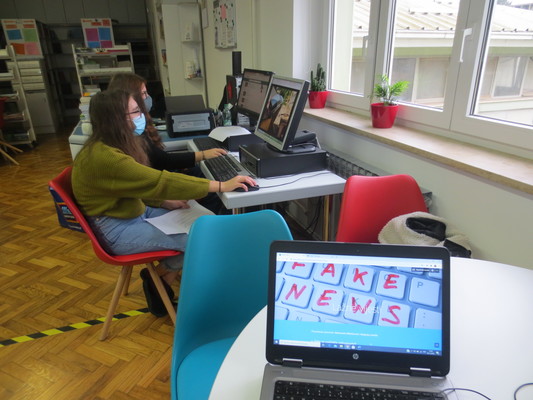
It is important to check the content, information and messages we find in the media, especially on social networks. One should be aware that information shared within closed groups on social networks are not based on facts but often on someone's personal opinion. I evaluate internet sources by checking the author and any information that can be found about him or her. When I read the news on a website, I always check its Impressum (or About us category) and I also browse other sources on the same topic in order to compare information. When looking for relevant information, it is important to check the date and time of publication. During the workshop about fake news that I participated in, we were instructed how to check the relevance of photos as media content that usually accompanies the text. We learned to use Tineye app which provides information about statistics related to the use of a certain photo found on the internet.
Since we are constantly exposed to the media and the content of various quality and credibility, it is important to encourage students to check information they find on the internet. If we applied the criteria for evaluation of online information during regular lessons at school more often, we would be better at critically evaluating them. In this way we would improve our media literacy skills.
Ana Vondraček, 8.b
School newspaper group
Primary school „Đuro Ester“ Koprivnica
OŠ "Doistej Obradović", Ćićevac - Srbija
FAKE NEWS.doc
Fake news
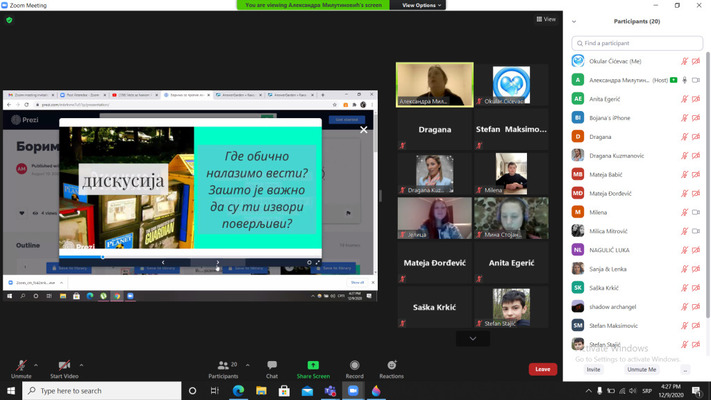
Fake news is not the truth. They were created in order to attract as many readers as possible, to access some content on the Internet or on the site, so they can click on that content and thus bring profit to the authors of the site. There are many newspapers and internet portals in Serbia that place fake news, and the purpose of their publication, sometimes, is not only advertising, but also the influence that this news can have on public opinion.
It is known that once something is posted on the Internet, it always stays there, and that any denial cannot be as loud as the news that was first published, even if it was fake. There are several searchers or portals that “hunt” fake news, so you can easily check on the Internet whether the information you are reading is correct or not. If there is something in the title that is SHOCKING and SENSATIONAL, it is almost certainly news that is not real. Use your logic, because if you read something that is meaningless and unbelievable, it will be fake news rather than real news.
This month, we had a workshop on this topic, which was held online by our teacher Aleksandra Milutinović. To attract us, she used a trick. She announced the workshop as an event where we can find out if it is true that Santa Claus received permission this year to move around the world and distribute packages to children, regardless of the corona virus pandemic. However, that was not fake news. Indeed, at the end of the workshop, we learned that Santa Claus in Ireland was allowed to move, but an MP in their assembly asked the children not to be in their living rooms where there is a Christmas tree while Santa Claus brings them presents, but to sleep, so as not to meet Santa Claus and put him and themselves at risk.
You can find the presentation about fake news on the link: https://prezi.com/mkrkvrw7u51p/presentation/
The site through which you can check whether the news you are reading is fake or real is:
Home page
IC BERTOLOTTI - GAVARDO (BS) - ITALY
Comments about fake news_ Workshop_December.pdf
December 2020
Workshop about fake news
I think fake news is to be banished, clickbaits for example are not a problem but fake news on sensitive topics are very dangerous. The fake news is only for cheating and scamming people (Christian S.)
I think that fake news is very dangerous for the people who don’t know what is true and what is false.
At school during a debate we said that working on fake news help you to recognize the truth and be more responsible, for me it is not true because if the fake news wouldn't exist we didn’t need to be aware. (Sofia Bedussi).
I think that the news published in the media must be true because the news can convey a lot and it is not a joke, in the class we discussed about this topic: it is a problem if we believe in fake news. (Martina Gnecchi)
In my opinion, it is very dangerous to write fake articles, because it makes you believe in untrue things, making you have a negative or positive view of something that is the opposite of your opinion. (Samirha Ouoni)
I think that fake news is very dangerous because people might believe and spread the wrong things.
Portuguese: não é de hoje que mentiras são divulgadas como verdade, e muitas vezes jornais bem conhecidos costumam divulgar notícias do gênero, autores que criam manchetes absurdas; qualquer tipo de informação falsa, da mais simples à mais descabida induz as pessoas ao erro. (Agatha)
Fake news
During the workshop I learnt how to discover fake news in a website, for example a website has always grammatical errors in its posts, strange elements and usual photos. Another example is when an article is written by an anonymous.
Now I know how to find fake news and I think that today this topic is very important because on the internet we can find all we want. So it is important to use our brain when we are searching for information on the internet but also anywhere. (Michele Bresciani)
The fake news is wrong and can be dangerous for those who read that since it can convey wrong information. (Alice Ragnoli)
Gymnasium school nr. 6 Suceva - Romania
Gymnasium School Nr. 6 Suceava / Romania
Combaterea știrilor false - ATELIER.docx
"I never thought that false news spreads out of a desire to harm one's reputation or to make a profit. Now I realize the powerful financial and political goal of fake news! ”
(Student, Andreica Maria, 5th grade)
"That's Maria!" Through the workshop "Fighting false news" that I conducted in school I found out that the reasons behind false news are numerous: political reasons, self-promotion, damaging the reputation of a person or organization, certain material gains, etc.
(Student, Simioniuc Rareș, 5th grade)
“Through this workshop I learned that we can distinguish between fake news and real information, but sometimes it can be difficult, especially when fake news is created by professionals.
What can we do concretely?
- Do not believe all the news we read online or hear on TV and ask questions about the evidence that supports that information;
- To read information and articles from reliable sources, which respect ethical standards in journalism;
- Be careful to continue to share news on social platforms, especially when that information arouses strong emotions. etc. "
(Student, Chitic Florin, 5th grade)
"That's Florin!" What else can we do?
- If we have doubts about a news item or article, let's do a quick internet search on that topic, to find credible sources. If we are still not convinced of the veracity of the information, it is best to avoid distributing that post further;
- Let's discover our own prejudices. When we become aware of them, there is less risk that they will influence us to believe the false news in consensus with these prejudices. "
(Eleva, Bolohan Gabriela, 5th grade)
"I agree with you! It would be much more effective if we learned to think critically from school, to know how to choose reliable sources of information, to develop a kind of scientific curiosity and not to take things for granted. "
(Eleva, Gherman Antonia, 5th grade)
,, Through this workshop we learned how to verify the sources of information:
- We check the author. We are looking for information about the author / article - is he a real person, how credible is he ?;
- We check the date of the news / article. The distribution of old information may not be relevant to the current situation;
- We check our own prejudices. We must consider whether our beliefs affect our judgment. ”
(Student, Arim Rares, 5th grade)
,, Here I can also complete:
- We check if the news / article is not a joke, respectively a satire. Checking the site and the author can help us in this regard;
- We can turn to an expert in that field to check if the news is true or not. ”
(Student, Niță Adina, 5th grade)
"Also, during this workshop, I found out some measures against spreading false news. Because the phenomenon of false news has taken on great proportions, we try to limit it as much as possible. For example, publications and publishers try to develop communities of readers. In some countries, subjects have been introduced in the school curriculum where pupils and students learn how to recognize and manage misinformation. ”
(Student, Labiuc Andreea, 5th grade)
"Social media platforms are also trying to make advertising policies more transparent. Some authors believe that the most important measure, at least for now, is for each of us to distinguish between false news and evidence-based information. ”
(Student, Pletea Claudiu, 5th grade)
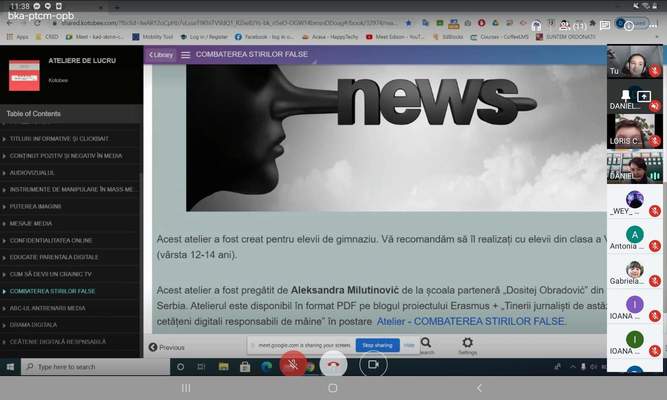
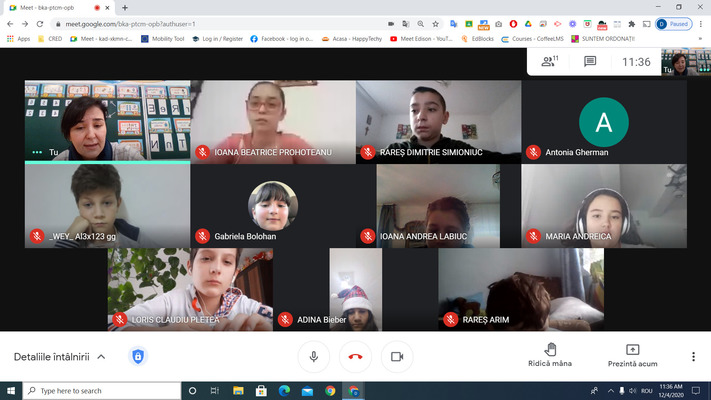
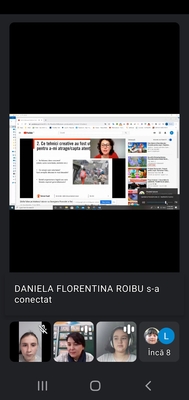
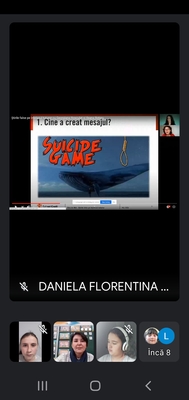
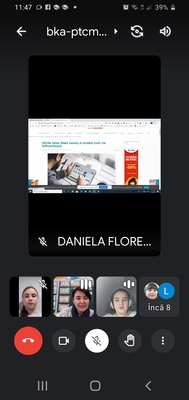
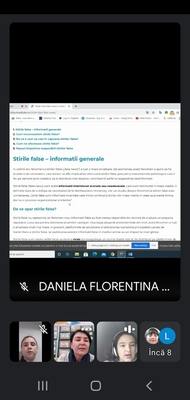
SCOALA GIMNAZIALA ,,MIHAI EMINESCU”, ALEXANDRIA, ROMANIA
FAKE NEWS.docx
Workshop- Combating fake news
On December 10, 2020, the workshop "Combating fake news" was organized, with the 5th graders, online workshop attended by 28 of the students in the class, together with teacher Georgiana Gusa.
The workshop is part of the Erasmus + project KA229- "Young journalists today - responsible digital citizens tomorrow". The purpose of this workshop was for students to know how to differentiate true news from false news, based on certain criteria, to find out about false news and why it exists: to reflect on the impact of their own opinions, on how they evaluate information, to discuss and to practice using criteria to evaluate the information they find online.
During this workshop, students learned about the characteristics of false news and pseudoscience and how they are created and how to differentiate false information from real information. Some students found and presented examples of false news, and others discussed based on an article that presented false news, based on a topical issue. Our teacher Georgiana Gusa presented a list of the top 10 fake news, most often accessed online, in 2019.
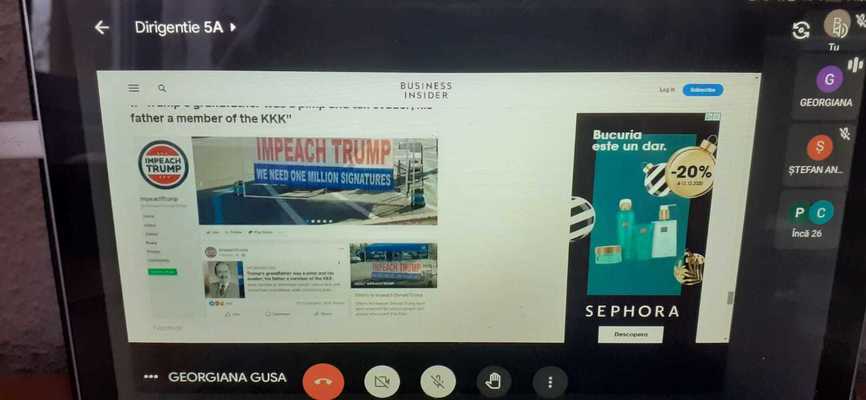
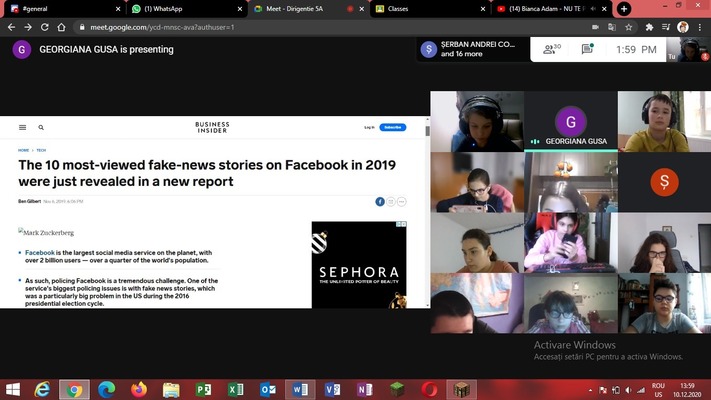
Here is what the students had to say:
Bogdan Paunica:
"From this workshop I learned how important it is to know how to choose what I read and not be fooled by false titles."
Roxana Cobarlie:
"Now I know that before I click on an article, I need to find out details about the site and the author of this article to determine how credible the sources are."
Radu Olteanu:
"Finding the original source of the story is what I need to do to find out if the news is true or not."
The teacher chose to talk to students about fake news, a phenomenon that has become widespread in recent years, because “It is important for students to know what effects the information they take from the media, but also those that are they can produce if they do not communicate correct data further ”./Catalin Grasa/5 A/ photo G.G.
OŠ,, Ivo Andrić'' Pranjani- Serbia
Workshop Fake news.docx
Workshop Fake news
The workshop was realized on 3.12.2020. with the students 7. and 8. grades. The students worked in groups. Each group received several different articles. Some were true and some were false. The groups had the task of recognizing false articles from true articles. After that, we are discussed. Students were delighted. They said:
Milenko: I want to make a Facebook page and write fake news. 😊
Tijana: It is not okay to write fake news, because someone can believe it.
Nikoline: Fake news serves to get votes. That is not right.
Marko: It is easy to recognize fake news. It is enough to check who published it and whether it was published somewhere else.
